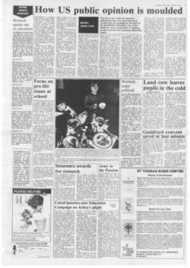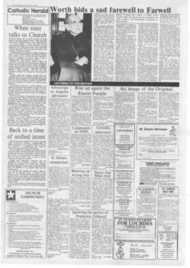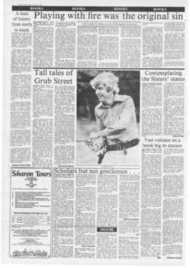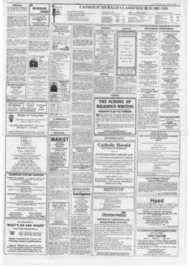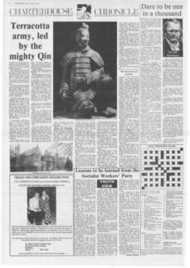Page 5, 19th February 1988
Page 5

Report an error
Noticed an error on this page?If you've noticed an error in this article please click here to report it.
Tags
Share
Related articles
Lenten Reflection
The Parish Course
First Sunday In Lent
A Look At Lent
`mid-lent Not Too Late'
Starting Lent among the animals
SCRIPTURE NOTEBOOK
Sunday, February 21 First Sunday of Lent Readings: Genesis 9.8-15 1 Peter 3.18-22 Mark 1.12-15
EACH year Lent is a renewed spiritual journey. It is a journey through the wilderness. The children of Israel, and later the prophets, were led out into the wilderness to find life stripped to its basic essentials, with the need for self-denial, discipline and prayer, in order to find God.
Our Lord Himself followed this hallowed tradition and was in the wilderness for 40 days. The Church wishes to be there with Him during this season. When we get accustomed to the wilderness we discover that it is not a dead or empty place. but one that teems with all sorts of life, wonderfully adapted to the conditions there.
Television nature programmes have disclosed what an abundance of animal life there can be in the desert. Animals are prominent in today's readings. What is their significance?
They appear in the reading from Genesis as part of a restored harmony, when God renews His Covenant with Noah and his sons after the Flood has subsided. In the ancient story the Flood is a consequence of the mystery of sin and evil. A cumulative tide of sin, greed and violence grows steadily throughout the early chapters of Genesis after the story of the Creation and Fall.
It washes over the human race and extends to the total environment including the birds and animals. But there are islands of goodness, men like Noah, who have integrity and walk with God. God does not cease to be a loving Creator, showing kindness and compassion.
In the saving of Noah, with his family and the representatives of all living creatures, we are given a sign of the faithful remnant (a frequent theme in the prophets), through whom God will show mercy to mankind. Through Noah the Covenant reaches "every living creature of every kind".
Just as God established a harmony with the living creatures in the Garden of Eden, under the dominion of the first man, Adam, so He promises a renewed harmony in a purified creation.
Our modern concern with ecology should help us to enter into this insight of the Hebrew mind. The balance of nature can be destroyed by human greed and thoughtlessness. The harmony with God and our neighbour should include our care and respect for the world around us.
The passage from the First Letter of Peter relates the symbol of the Flood and the salvation of the remnant to the effects of Baptism. For the Lenten readings are based on the fact that this season began as a course of instruction and penance to prepare adults for baptism at Easter.
In many parishes today we have become aware of this and more actively involved with the process as the family of the Church through the Rite of Christian Initiation of Adults.
Already as we set out we are given a glimpse of the goal of our Lenten journey: baptism, our share in the paschal mystery of death and resurrection of the Lord, Paradise regained.
On the First Sunday of Lent the gospel always focuses on Our Lord in the wilderness. In other years, when Matthew and Luke are used, our attention is drawn to the details of the temptations and their significance. But Mark simply says: "The Spirit drove Jesus out into the wilderness and he remained there forty days, and was tempted by Satan. He was with the wild beasts and the angels looked after him".
This encourages us to keep our eyes on the person of Our Lord rather than on the details of His conflict with Satan. We can simply wonder at the humility of one who is "like us in all things but sin", the pioneer of our faith, who has gone before us (Heb.12.21.
Anthony Nye SJ
blog comments powered by Disqus




